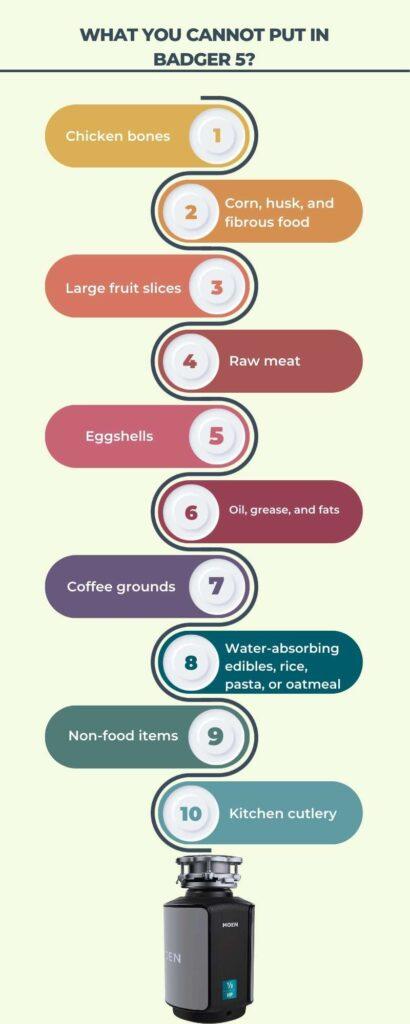A garbage disposal is a convenient and useful appliance that helps to keep your kitchen clean and free from food waste. However, not all foods are suitable for garbage disposal. Some foods can cause clogs, damage the blades, or create unpleasant odors. Here are some of the worst foods for garbage disposal.
Some Worst Foods for Garbage Disposal

1. Grease and oil:
Grease and oil clog garbage disposal blades, causing operational difficulties and blockages. They also attract food particles, compounding clogging issues. To prevent clogs, cool and dispose of grease in containers, and use drain strainers to trap food debris.
2. Fibrous foods:
Fibrous foods can clog garbage disposals. Their long, stringy fibers can tangle around the blades, jamming them and causing damage. To avoid clogs, chop fibrous foods into small pieces or compost them. Regularly flushing the disposal with cold water and using ice cubes to sharpen the blades can also help.
3. Starchy foods:
Starchy foods, such as pasta, rice, and potato scraps, can clog garbage disposals. When wet, they expand and become sticky, adhering to the disposal blades and forming clogs. To prevent clogs, use cold water while disposing of starchy foods and dispose of them in small batches.
4. Bones:
Never put bones in a garbage disposal. Garbage disposals are designed to handle soft food waste, not hard and dense materials like bones. Trying to dispose of bones can damage the disposal’s blades, motor, and other components. The sharp edges of bones can dull the blades and cause clogs in the plumbing, leading to costly repairs. Dispose of bones in the trash or compost them instead.
5. Coffee grounds:
Coffee grounds are a controversial topic when it comes to garbage disposals. Some believe they can clean and deodorize the disposal, but this is not true. Coffee grounds are dense and can clog the pipes, and they don’t break down easily, which can strain the motor.
To safely dispose of coffee grounds in a garbage disposal, mix them with plenty of water to help move them through the plumbing. However, it’s often better to discard coffee grounds in the trash or use them as compost to avoid problems.
6. Fruit pits and seeds:
Fruit pits and seeds are a no-go for garbage disposals. These hard objects can damage the blades and motor, leading to costly repairs. Grinding fruit pits and seeds can dull the blades, jam the mechanism, and cause plumbing issues. Discard fruit pits and seeds in the trash or compost them to reduce waste and enrich your garden.
7. Eggshells:
Eggshells: to grind or not to grind? That’s the question when it comes to garbage disposals. Some claim eggshells can help clean and sharpen the blades, while others warn they can cause clogs. Eggshells are hard and can create tiny particles that can contribute to clogs over time.
To safely grind eggshells, crush them thoroughly and mix them with plenty of water. However, for a hassle-free approach, it’s often better to compost or trash them.
8. Meat scraps:
Meat scraps can be both a blessing and a curse for garbage disposals. They grind up easily, but the grease they leave behind can lead to clogs and odors over time. To prevent these issues, use cold water when disposing of meat scraps. This will solidify the fats and oils, making them easier for the disposal to handle.
9. Shrimp tails
It is generally not recommended to put shrimp tails drown the garbage disposal. Shrimp tails can damage garbage disposal blades and clog plumbing, so it’s best to avoid putting them in the disposal. Some people claim that small amounts of shrimp tails are safe to grind, but it’s still a risk, and the shells may leave behind odors. To dispose of shrimp shells safely, discard them in the trash or compost them.
Run Cold Water While Using the Garbage Disposal
It is also important to run cold water while using the garbage disposal to flush the waste down the drain and to avoid overloading the disposal with too much food at one time. Regular cleaning and maintenance can also help prevent problems with disposal.
Size Of the Food Scraps
Another thing to keep in mind is the size of the food scraps. The smaller the food particle, the less likely it is to cause clogs. So, it’s always better to chop up large chunks of food before disposing of them.
Avoid Some Food Scraps
Additionally, it’s important to note that garbage disposals are meant to handle only some types of food waste. Some food scraps such as potato peels, fruit rinds, and other fibrous foods should not be put down the disposal. These types of food scraps should be composted or thrown in the trash.
Frequency Of Garbage Disposal Use
It is also important to consider the frequency of garbage disposal use. If you use your disposal frequently, invest in a high-quality model that can handle heavy use. Additionally, regular cleaning and maintenance can help prolong your disposal’s life and prevent clogs and other issues.
Can any food scraps be safely disposed of in the garbage disposal?
Yes, some food scraps can be safely disposed of in garbage disposal. Soft foods such as fruits and vegetables without hard skin, small amounts of cooked pasta or rice, and non-fibrous leftover food can usually be safely disposed of. However, it is important to consult the manufacturer’s instructions for your specific waste disposal unit to ensure safe use.
What should I do if my garbage disposal gets clogged or damaged?
If your waste disposal stops or deteriorates, it’s best to avoid trying to repair yourself if you’re not experienced. First, shut down the unit and disconnect the power source. Then, contact a professional plumber or a qualified technician who can safely assess and solve the problem. Trying to fix it yourself can cause further harm or even personal injury.
Conclusion
In conclusion, certain foods can cause damage and clog garbage disposal if not correctly disposed of. These include fibrous foods such as corn husks and celery and starchy foods like potato peels, grease, and oil. It’s best to avoid putting these items down the drain and dispose of them in the trash to prolong the life of the garbage disposal.
How Long Do Garbage Disposals Last depends on what type of materials you put down it. Additionally, it’s always a good practice to run cold water for about 15 seconds before and after using the garbage disposal and avoid overloading it with too much food at once.

